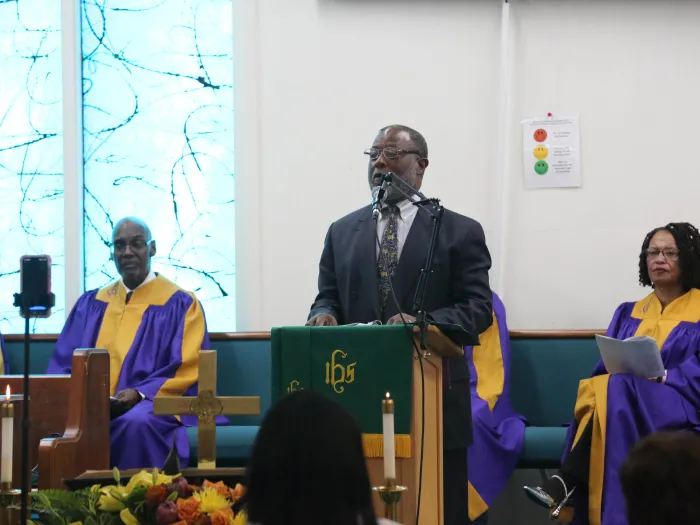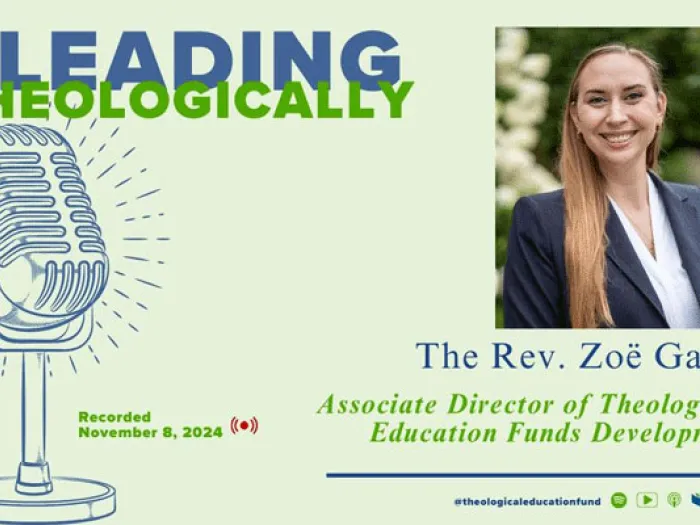New tools for church treasurers can ease the burden of the job
Stewardship Kaleidoscope offers up valuable training for church folks who provide an important service


Being a church treasurer has become more complex in recent years. This largely volunteer job goes far beyond simply doing the math to ensure the books are balanced and the bills are paid.
Today, church treasurers and church staff in general need to be aware of the many ways the church can be defrauded, either by internal trusted people or by scammers who find ways to trick staff into disclosing information.
And there’s tax matters to consider, including keeping the church’s 501(c)(3) status.
Edd Breeden and Diane Case have a deep well of experience to cover all of these matters, and did so in an engaging workshop called Church Treasurer’s Training at Stewardship Kaleidoscope in Portland, Oregon, on September 23. Stewardship Kaleidoscope is an annual conference on church stewardship, generosity, and finances organized by the Presbyterian Church (U.S.A.) and the Evangelical Lutheran Church in America.
Both Breeden and Case work for the Presbytery of San Jose in California. Breeden is the author of the “Church Treasurers Manual.” A new version of the book will be released in November and can be purchased on Amazon.
They’ve done similar training for 15 years, typically taking three hours on a Saturday morning for the workshop. At Stewardship Kaleidoscope, they had 90 minutes to cover the material.
The main duties of a church treasurer, as defined by Breeden and Case, are:
- Keep orderly financial books and records
- Follow instructions of the governing board (in a PC(USA) church, that’s the session)
- Notify the board (or session) if you see anything that seems incorrect, off, or problematic
- Keep a sharp eye out for potential fraud
- Ensure the church doesn’t overspend, and flag questionable spending for the session or finance committee to review
- Conduct an annual audit or review
- Oversee the budget and ensure the church continues to live within the budget
Breeden noted that the main issue churches face is their 501(c)(3) status, and ensuring they maintain it. “Exemption is a privilege, not a right,” Breeden says. “If the organization looks exempt but does not act exempt, it is not exempt.”
Many organizations believe that it is their activities that make them exempt, but the larger factor in determining the status is how they raise their funds. Also, if you decide to rent your property to a for-profit entity, it may risk your 501(c)(3) status. Check with your church’s attorney or other professional advisor before taking on such a tenant.
As always, Breeden and Case both emphasized the importance of checking with your own experts in your own region or state to ensure that you’re following the laws that apply in that area. Some matters do vary according to state law.
Fraud prevention
Breeden and Case have seen quite a bit of fraud in their time working in churches, and there are some simple ways to prevent it. Breeden noted that 85% of all fraud comes from trusted church members. “Trust is not an internal control,” Case says.
Good accounting processes can take away opportunities for theft or fraud; the key is to separate responsibilities. Two unrelated people count the cash that comes in during the offering; a third unrelated person takes it to the bank.
Case noted that requiring two signatures on checks doesn’t provide as much security as people think. Most banks do not review the signatures on checks, as Case discovered when she sent a check through without signatures to test the bank’s fraud prevention.
To prevent online fraud or hacking, use Two Factor Authentication (2FA) on every account, which requires users to get a code at sign-on through email or on their phone and enter the code along with their password. This keeps accounts from getting hacked, and is useful on every kind of account, including email. “It’s a pain, but it’s so important and effective,” Breeden says.
Both Case and Breeden advocated for cloud-based accounting software with 2FA. All accounting software is moving to the cloud; it is easier to use than software that is stored on a computer and doesn’t require expensive updates. It is also accessible to multiple people with their own log-ins rather than living on one person’s computer.
The treasurer should download the bank statements directly and compare them to the accounting software or financial records. “In one case, a church was defrauded of $40,000,” Breeden says. “The person with the statements was somehow providing bogus bank statements that matched QuickBooks. If the treasurer had downloaded the bank statement themselves, the treasurer would have seen the discrepancy.”
Case also advocated for ACH payments and advised against mailing checks. The presbytery itself fell victim to fraud when a check mailed for payment did not reach the recipient, and instead, was washed and altered; the presbytery was out $55,000, which had to be reimbursed by insurance. The money was later recovered, but it was an expensive and cumbersome lesson. Breeden said that you can buy checks that cannot be altered, with special ink and paper, but those checks will cost more. It may be worth it if your church mails checks often.
Positive Pay is another way to involve your bank in helping prevent fraud. The holder of the account, in this case the presbytery, sends the bank a list of payments and amounts that have been made. Prior to paying, the bank compares the payees and amounts to the list provided by the presbytery. This service does cost, but reverse positive payments do not. With reverse positive payments, the bank sets up payments in their online system, and the account holder logs in online and verifies the payments. The one disadvantage with this system is if the account holder doesn’t take any action, the payments go through anyway, so the account holder needs to be diligent and ensure they tend to the account.
Lastly on the topic of fraud, Case advocated strongly for a system of sharing secure documents. Do not email any sensitive account information or attach it as an email. Instead, use a vendor such as box.com to set up documents and share them. Email simply isn’t secure enough for such information.
Preparing for disasters
With natural disasters becoming more common, it’s key to ensure you’re ready to show an insurance company what your church owns.
Take photos of everything your church owns, including items that are in storage but not used. Your renters should do the same. “Insurance companies don’t care if you use the item,” Case says. “They will reimburse you for its value.”
Your church will also need a way for the head of staff (or other appropriate staff) to access immediate funds to get the church up and going again. About $10,000 emergency funds, immediately accessible, is a good rule of thumb. Creating a wish list on Amazon gives those who want to help the church a way to do so.
Churches also need to decide if they want to continue to meet, and if so, where. Breeden advises keeping the same service time, so that members of your church have a sense of normalcy.
And when it’s time to rebuild, make sure that the number of parking spaces meets the number of people who will be using the church. Breeden says he knows of a church that was forced to sell because they lost their occupancy permit due to lack of parking. “The building just sold because they could no longer meet there,” Breeden says.
Other matters
Every church should do a financial review annually. Whether or not a full audit is required depends on the size of the church or ministry. Case suggested that one way for churches to find a neutral party to review the books is to find another similarly sized church and swap financial records for a financial review.
Be careful who fills out financial forms and tax forms for the church, Case says. The person who typically handled this was out on leave at one church and someone else filled out a tax form, but didn’t understand how to do it correctly. The church received a $65,000 tax bill. The presbytery is helping the church resolve the matter.
One surprising task that Breeden outlined was to encourage the church to express gratitude for gifts that are given to the church. “The church I’m attending right now, they talk about two big things that are going on in the life of the church every Sunday,” Breeden says. “Then they always say thank you for your generosity that makes all of these things possible. They do that every Sunday. If you’re taking up an offering every Sunday and you’re not thanking people, you’re not raising much money.”
You may freely reuse and distribute this article in its entirety for non-commercial purposes in any medium. Please include author attribution, photography credits, and a link to the original article. This work is licensed under a Creative Commons Attribution-NonCommercial-NoDeratives 4.0 International License.




